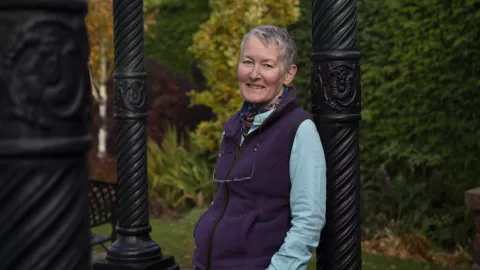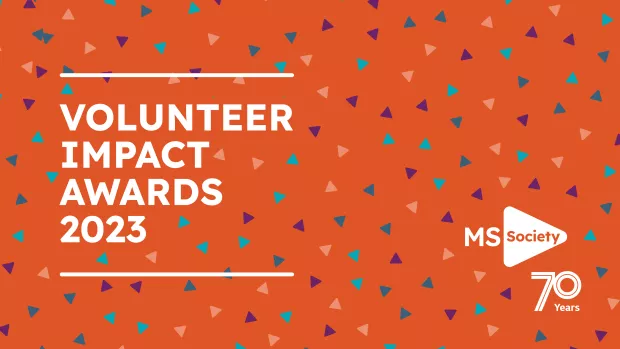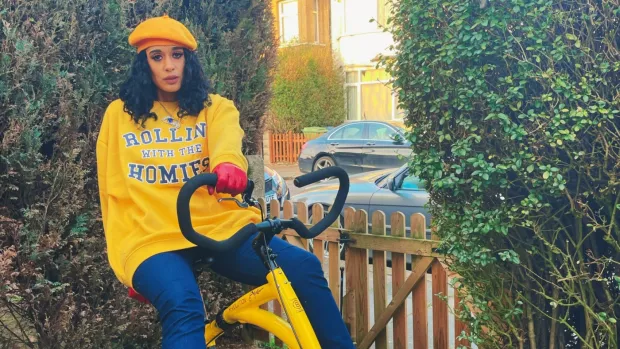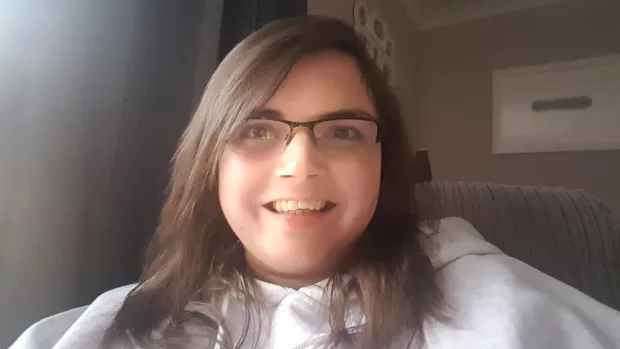
Volunteering has been a real learning curve
Terri is Group Coordinator of our East Cumbria Group. She tells us about her enthusiasm for getting people into the great outdoors and why she shares her lived experience to influence service provision.
I was Professor of Bioinformatics at the University of Manchester when I was diagnosed with primary progressive MS in 2017. I had a very busy academic career and spent a lot of time travelling to international meetings. When I wasn’t running around the globe, I’d be off hiking or cycling with my partner (and dog!). In the last six years, MS has had a massive impact on my life. I started to find all the travelling exhausting and my job increasingly stressful.
When I took ill-health retirement, I found myself suddenly cut off from my academic career. I missed it, and my international colleagues. But being professor emerita (given a special title and privileges by the university) allowed me to continue with the scientific publications I hadn’t finished. I’m also helping my colleagues to write teaching guides. It helps that I can still be productive.
MS has had a significant impact on my ability to walk. I do still hike, but more slowly and with greater difficulty. And I still have crazy goals, like climbing Helvellyn. I’m going to do that however long it takes, and however badly I’ll be affected by fatigue afterwards. All the active things I like to do are now made more challenging by the progression of my MS.
Getting roped in
My involvement with the MS Society began in 2018, when I started attending a weekly local exercise class. A member of the MS Society East Cumbria Group, who organised the classes, invited me to one of the group meetings, so I went along. I found it a bit dull, but was somehow persuaded to take up a volunteering role. Many months later, when nobody had stepped up to replace the retiring Group Coordinator, somebody suggested that I could do it. I reluctantly agreed, so long as somebody would help me, and here I am.
I think the group has gained a new kind of vibrancy in recent years. I’ve revamped the newsletter to make it a more professional reflection of us, and we’ve got a very active Facebook page. I also collaborated with other MS Society groups to produce a Cumbria-wide booklet about what we all offer.
Sharing my passion
Being in the great outdoors is such a positive, healing thing. So, we’ve brought back residential trips to the Calvert Trust, because I was keen to motivate people to try new outdoor activities. We also encourage people to come out to a local nature reserve. You can go there for a coffee or a walk, or hire specialist bikes for disabled people and cycle around. And we now have thriving subsets of the main group in Carlisle and Penrith. They organise and fund their own activities like horse riding and canoeing.
It’s so rewarding to see the positive impact these activities have had on people with MS. It just required somebody with the enthusiasm, and the right mix of people in the group, to make them happen.
Raising awareness
Neurology health provision in Cumbria is a bit of a disaster. I’ve been keen to support MS Society staff in their talks with the NHS to seek local improvements. It’s very important for service providers to get insight from those of us living with MS. Being able to tell them directly how their decisions affect us can be very impactful. It helps them to actually see us as real people, rather than just talking about us as clients.
I also talk a lot to the MS nurses. I give them our publications and encourage them to distribute our newsletters to newly diagnosed people. I give talks at their Information Days. We also create information packs, containing our brochures and MS Society publications, for the infusion nurses to give out to the people who come to their clinics.
We’re very keen to reach out to the community to let people know there’s a support group out there — they don’t just have to rely on an annual MS nurse visit to talk to someone who ‘gets it’.
Trying new things
Looking ahead, we’re launching a subsidised physiotherapy service to sit alongside NHS provision.
The local NHS neurophysiotherapists felt they were meeting the needs of the community and didn’t have waiting lists — but I’d had to wait six months for an appointment! So, being stubborn, I decided we should set up our service anyway. We’ve now got physiotherapists lined up and will complete the paperwork very soon.
Private physiotherapy is expensive. The group can only partly subsidise the sessions, so it remains to be seen how much take-up we get. We’ll run a pilot for six months and see how it goes. But, whatever the outcome, at least we’ll have tried.
Learning and collaborating
Within academia, you rub shoulders with people who broadly think and work like you do. Volunteering’s thrown me into environments where I meet very different people. And that’s been a real learning curve — having to change how I do things and realising that other people often don’t think or interact in the same way. And it’s given me important insights into other people’s struggles with MS and how it affects everyone very differently.
Locally, I’ve enjoyed building relationships with the MS Society staff supporting groups in my area. And through my involvement in various national advisory groups I’ve worked with other staff members at all levels. I’ve gained valuable insights into how the MS Society works and had the chance to offer my perspective. Which has made me feel more connected to the organisation.
I’d encourage anyone to volunteer because it provides a sense of purpose. You’re doing something that matters to other people. You get a lot out of it and you learn a lot. And, along the way, if you can help the MS Society to better achieve its aims, that’s got to be a good thing!




